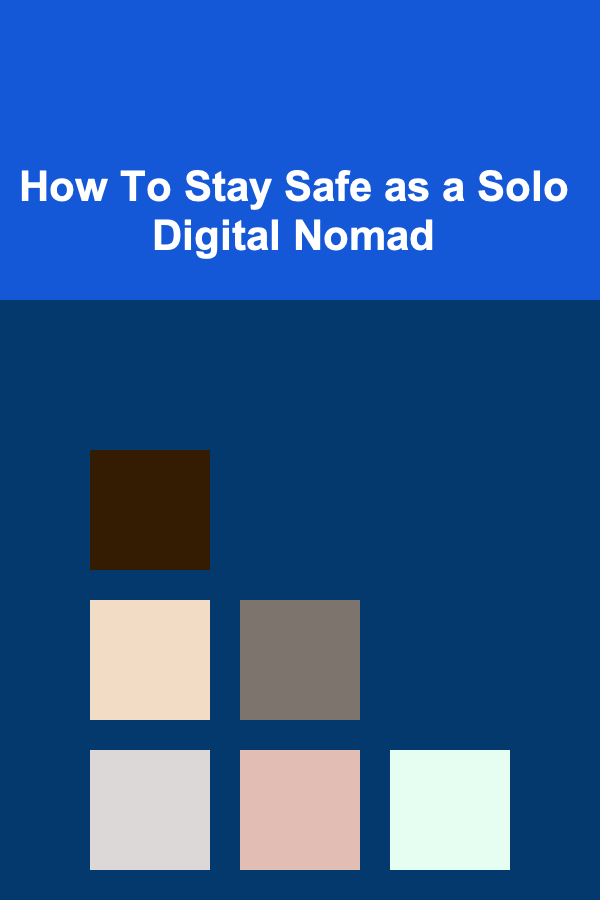
How To Stay Safe as a Solo Digital Nomad
ebook include PDF & Audio bundle (Micro Guide)
$12.99$11.99
Limited Time Offer! Order within the next:

The digital nomad lifestyle has become increasingly popular in recent years. With the rise of remote work opportunities and advancements in technology, more and more people are choosing to work from different countries, cultures, and environments. The allure of freedom, travel, and flexibility makes the idea of being a solo digital nomad enticing to many. However, while the experience can be enriching, it also comes with unique risks, especially when it comes to safety.
As a solo digital nomad, you're not only managing the challenges of your work but also navigating unfamiliar places, handling logistics, and ensuring your personal safety. This article will explore the best practices and tips for staying safe as a solo digital nomad, covering aspects from personal security to mental health.
Research Your Destination Thoroughly
One of the first steps to ensuring your safety as a digital nomad is to research your destination thoroughly before you arrive. Understanding the local culture, laws, and common safety issues will allow you to make informed decisions and avoid potentially dangerous situations.
Understand Local Safety Concerns
Every country and city has different levels of safety, and some places may have higher crime rates or specific safety concerns. For example, in some areas, petty theft like pickpocketing may be common, while in others, political instability or natural disasters may pose a greater risk.
Use reputable sources to gather information about your destination, such as government travel advisories, local forums, and blogs written by other digital nomads. Websites like Nomad List can provide valuable insight into the safety of specific cities and regions.
Research Healthcare and Emergency Services
When traveling as a solo digital nomad, access to quality healthcare is an important consideration. Before arriving at your destination, research the availability and quality of medical services in the area. Look for nearby hospitals or clinics, and ensure that your health insurance covers medical care abroad.
In addition, familiarize yourself with emergency numbers and protocols for your destination. In many countries, emergency services may be different from what you're used to at home. Knowing who to call and what to do in case of an emergency can save valuable time and potentially save your life.
Protect Your Personal Belongings
As a solo digital nomad, your personal belongings are your most valuable assets, both for your safety and work. Losing your laptop, phone, or important documents could have serious consequences, so taking measures to protect them is essential.
Invest in Good Travel Insurance
Travel insurance is one of the most important investments you can make as a digital nomad. It provides financial protection in case of accidents, illness, theft, or other emergencies while you're traveling. Make sure your insurance covers personal property theft, emergency medical evacuation, and trip cancellations, as these can be especially important when working remotely.
Check the coverage carefully to ensure that electronics, such as laptops and phones, are included in case of loss or damage. Some travel insurance policies offer coverage specifically tailored to digital nomads, so it's worth exploring options that align with your lifestyle.
Use Anti-Theft Gear
Invest in anti-theft gear to protect your belongings when you're on the move. For example, a secure backpack with lockable zippers can help prevent pickpockets from accessing your valuables while you're walking or traveling in crowded areas. Additionally, consider using a money belt or neck pouch to keep your passport, cash, and credit cards safe from theft.
Many solo digital nomads also use tracking devices for their laptops and phones. These devices can help you locate your belongings if they are lost or stolen. There are apps and tools available that enable you to remotely lock or wipe your devices to prevent unauthorized access.
Be Mindful of Your Digital Security
In addition to protecting your physical belongings, it's crucial to safeguard your digital life. Digital security is an often overlooked aspect of safety for digital nomads, but protecting your online information is just as important as protecting your physical possessions.
Always use a VPN (Virtual Private Network) when accessing the internet, especially when using public Wi-Fi networks in cafes, co-working spaces, or hotels. Public Wi-Fi networks are often not secure, and using a VPN will encrypt your internet connection and protect your data from hackers. Additionally, enable two-factor authentication for all important accounts, including your email, bank accounts, and social media.
Keep your devices up to date with the latest security patches, and use strong, unique passwords for each of your accounts. Regularly back up important files to an encrypted external drive or cloud service to prevent losing valuable data in case your devices are stolen or damaged.
Secure Your Accommodation
Choosing the right accommodation is crucial for both your safety and comfort as a solo digital nomad. The type of place you stay in can influence your sense of security and impact your overall experience.
Choose Safe Neighborhoods
When booking accommodation, it's important to choose a safe neighborhood. Avoid areas known for high crime rates or poor infrastructure. Research online reviews and forums to get a sense of what the neighborhood is like and whether it's suitable for solo travelers.
If possible, try to stay in areas with a high concentration of other digital nomads or expatriates. These areas tend to be safer and more comfortable for remote workers, as they usually have a better infrastructure, reliable internet, and more amenities.
Use Trusted Platforms for Booking
To minimize the risk of scams or unsafe situations, always book your accommodation through trusted platforms, such as Airbnb, Booking.com, or reputable hotel chains. These platforms typically offer more transparency and security compared to less-established websites. Read reviews and check the ratings of previous guests to get an idea of the place's safety and overall quality.
Communicate With Hosts
Before arriving at your accommodation, establish clear communication with your host or property manager. Ask about safety measures, such as locks on doors and windows, and inquire about the neighborhood's safety. Be wary of any accommodation that doesn't provide clear communication or seems too good to be true.
If you're staying in a shared accommodation, like a hostel or a co-living space, make sure to lock your valuables in a secure location, such as a locker, and avoid leaving your belongings unattended in public areas.
Stay Connected and Build a Support Network
While traveling alone, it's essential to stay connected with others, whether that means keeping in touch with family and friends or building a support network of fellow nomads.
Stay in Touch With Family and Friends
Keep your family or close friends informed of your whereabouts and travel plans. Regular check-ins can be a lifesaver in case of emergencies. Share your itinerary and the contact details of your accommodation with someone back home, and let them know how often they should expect to hear from you.
In addition, you can use location-sharing apps or emergency alert systems to share your real-time location with trusted contacts. This way, your loved ones can track your safety in case you encounter any problems.
Join Digital Nomad Communities
While you may be traveling solo, there are numerous online communities and forums where digital nomads gather to share advice, tips, and experiences. Platforms like Facebook, Reddit, or Nomad List are great places to meet other nomads, exchange information, and get recommendations on safe places to stay and work.
Joining a local community of digital nomads can help you build a support network in your destination city. You can attend meetups, co-working events, or other social activities where you can meet other remote workers and gain insight into the local area's safety and opportunities.
Trust Your Instincts
Perhaps the most important safety tip for solo digital nomads is to trust your instincts. If something feels off or makes you uncomfortable, it's okay to say no, change your plans, or leave the situation. Your intuition is a powerful tool that can help you avoid dangerous situations.
If you feel unsafe in a particular location or with a particular person, remove yourself from the situation immediately. Whether you're out exploring a new city, working in a public space, or engaging with strangers, always listen to your gut feelings and err on the side of caution.
Stay Healthy and Take Care of Your Mental Well-Being
As a solo digital nomad, staying healthy is essential for maintaining your productivity and overall well-being. Traveling constantly can be physically and mentally taxing, so it's important to take care of yourself.
Maintain a Healthy Lifestyle
Maintaining a healthy diet, regular exercise routine, and proper sleep schedule can help you stay physically and mentally strong while working remotely. Make sure to eat nutritious foods and drink plenty of water, especially when you're in a new environment where it may be easy to neglect your health.
Exercise regularly, whether that's through a gym, outdoor activities, or simple stretches in your accommodation. Physical activity can help alleviate stress and improve your mental focus, which is essential for staying productive as a digital nomad.
Address Mental Health Challenges
Traveling alone can sometimes lead to feelings of loneliness or isolation. Mental health is an often-overlooked aspect of safety, but it plays a critical role in maintaining a balanced lifestyle as a digital nomad. Make sure to set aside time for self-care, and seek professional help if you begin to feel overwhelmed.
Consider staying connected with friends and family back home, as these relationships can provide emotional support. If you're feeling isolated or stressed, take breaks from work and explore your surroundings. Traveling is not just about work; it's also about finding joy and balance in new experiences.
Conclusion
Living as a solo digital nomad offers a sense of freedom and adventure, but it also comes with responsibilities when it comes to your safety. By researching your destination, protecting your belongings, securing your accommodation, building a support network, trusting your instincts, and maintaining your health and well-being, you can ensure a safe and enjoyable experience while navigating the digital nomad lifestyle.
By staying proactive and mindful, you can reduce risks, adapt to new environments, and fully embrace the freedom that comes with being a solo digital nomad.

How to Choose the Right Countertops for Your Kitchen Renovation
Read More
How to Use Deep Learning to Create Scalable Passive Income
Read More
How to Use Drawer Dividers for Closet Organization
Read More
How To Understand Cybersecurity for Small Businesses
Read More
How To Identify Waterfowl and Shorebirds
Read More
How To Acquire Basic Meditation Practices
Read MoreOther Products

How to Choose the Right Countertops for Your Kitchen Renovation
Read More
How to Use Deep Learning to Create Scalable Passive Income
Read More
How to Use Drawer Dividers for Closet Organization
Read More
How To Understand Cybersecurity for Small Businesses
Read More
How To Identify Waterfowl and Shorebirds
Read More